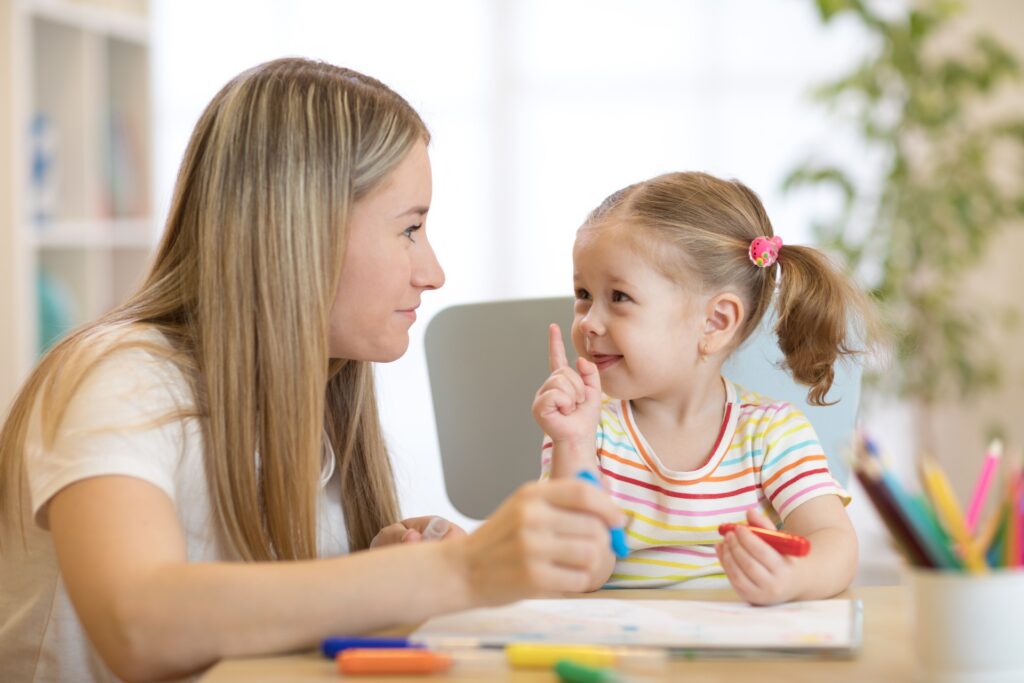As parents, we often wonder how to help our toddlers and preschoolers grow into strong communicators. The good news? You don’t need flashcards, fancy toys, or structured lessons to build your child’s language skills. The most valuable tool you have is just simple everyday conversations. When we talk, listen, and engage with our kids, throughout the day, it lays a foundation for vocabulary, comprehension, and confidence in communicating. Let’s look at these simple ways to build our children’s language skills.
Did you know that children who are exposed to frequent, rich conversations develop stronger language and literacy skills? This doesn’t mean that we have to set aside special time to have deep conversations with our kids though. Think about mealtimes, bath time, car rides, walks around the neighborhood, all of the natural talking times we have with our kids. Our daily routines are full of opportunities for meaningful conversation. Each little exchange adds up, helping our kids to learn new words, sentence patterns, and the back-and-forth rhythm of communication.
Ways to build our children’s language skills
Narrate Your Day
This might sound silly, but think of yourself as a sports announcer for your life. So you’ll describe what you’re doing, seeing, or feeling as you go about your day. This can actually help you out if you have an infant. With little babies, we can often wonder what on earth to say to them. So try narrating your day. “I’m cutting apples into slices. I’m brushing my teeth! We’re putting on your socks! I’m getting a glass of water!” It helps to add some fun descriptions, like “I’m cutting the apples into slices – crunchy and yummy!” Or “We’re putting on your blue socks – one, two!”
Narrating like this gives your child some vocabulary in context, and it helps our kids connect words with actions.
Ask Open-Ended Questions
While there’s nothing wrong with yes/no questions, open-ended ones are so much better for any conversations. Open-ended questions invite our kids to think and to share more about what they see or what they like. Instead of “Do you see the dog out the window?”, let’s ask, “What do you see out the window?” Or instead of “Did you like your soup?”, we could ask, “How did your soup taste?”
Open-ended questions can spark conversation and encourage more communication than one-word answers.They are a great way to build our children’s language skills.
Build on Their Words
This one is easy too, and many of us do this already. When your child says, “Doggy,” you can build on it by saying, “Yes, that’s a big, brown doggy running fast!” When we add details, it shows our kids how to use more descriptive language too.
If your family is building your language skills through signing, there are bunches of descriptive words and words for everyday life in our free Signing Time Dictionary. There are categories to help you find different words, and each word has a video and a description for how to do the sign.
Play with Language
Our kids’ learn through fun, so let’s build our children’s language skills with fun! There are so many rhymes and silly songs that can help us make new words stick. In fact, we have a lot of that over at My Signing Time. We love silly songs!
Even without silly songs and nursery rhymes, we can still play with language. For example, we could challenge our kids to find things that rhyme with hat or to think of a funny word that starts with b. Or try your own silly rhyming with ordinary words, like jumpy bumpy or quiet smiet or any kind of nonsense you can come up with. Your kids will love it!
Building our children’s language skills doesn’t require extra time or special skills. We simply need to talk with our kids about the big things, the small things, and everything in between. Our talking with them will help them to build skills in vocabulary, confidence, and connection. Every conversation is a building block to build our children’s language skills.

